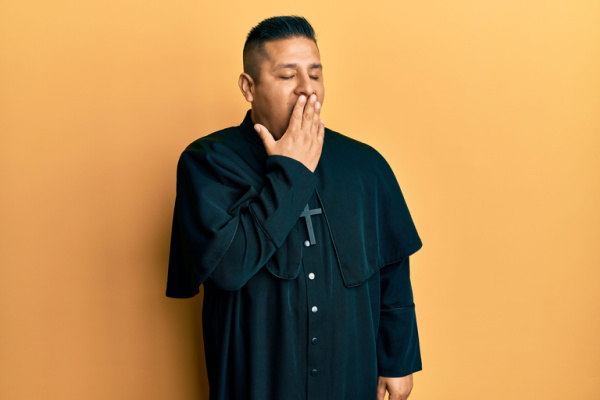
Why do I yawn when I pray is a common question many people ask.
More...
Yawning is a natural physiological response and is not always indicative of boredom.
Numerous spiritual rituals include prayer; a standard action that individuals perform while in prayer is yawning.
Generally, individuals yawn when their body needs rest; however, some yawn during spiritual activities due to their attention being on something else.
For example, they may be so focused on their prayer or meditation that they forget to take in a deep breath of air.
Moreover, yawning can be very beneficial in helping to relax their minds and bodies and can increase their level of concentration.
Why Do I Yawn When I Pray? Exploring The Surprising Connection
Why do I yawn when I pray should be a question on the mind of every person who regularly prays.
Although so, there's no one answer to this question, as yawning is a natural response to prayer for many people.
While praying, a yawn can signify that someone is not focusing on the words they are saying or the actions they are performing.
However, some believe that yawning is a way for the body to release tension and clear the mind.
Others believe yawning is a way to connect with God or other people in the room.
Although many believe that yawning during praying is inappropriate, others say it is a usual result of drowsiness.
Every person must figure out for themselves the real significance of their yawning.
Whatever the reason, yawning during prayer is a common occurrence.
So if you're yawning during your morning prayer, don't worry - it's probably just a sign that you're feeling relaxed and connected to God.
Why Do We Yawn?
A yawn is a reflex that is activated when the air passages in the mouth and nose are filled with oxygen, and the brain senses that the body is running low on oxygen.
Yawning is contagious and can be induced by environment, noise, or personal factors such as tiredness or boredom.
Why Do I Yawn When Others Yawn?
It is common to yawn when you see or understand another person doing so. Moreover, this happens due to a brain and body response to another person's yawn.
When another person yawns, your brain and body react similarly, reducing stress and increasing oxygen flow to the brain.
Also, this ultimately leads to a sense of relaxation and improved cognitive function.

Take a Break Before Prayer
Yawning can occur during prayer due to emotional states common in bored individuals, in an exhausted state, or under emotional stress.
Likewise, yawning can also signify that you need to take a break and relax.
Yawning can be distracting because it occupies your attention and interferes with your focus on the words of your prayer.
Moreover, it can also be distracting because it is associated with relaxation.
If you feel like yawning during prayer, don’t ignore it. Instead, stop and give yourself some time to refresh. For instance, you can take a short nap or rest for a few minutes.
In like manner, if you’re praying with others, let them know that you need a few minutes to rest and recharge.
Furthermore, if you’re on your own, take a few deep breaths and do something relaxing.

34 Reasons Why You Yawn When You Pray
Header | 1 - 10 Reasons Why You Yawn During Prayer |
|---|---|
1 | Lack of Sleep or Rest |
2 | Fatigue |
3 | Stress and Anxiety |
4 | Boredom |
5 | Feeling Overwhelmed |
6 | Low Blood Sugar Levels |
7 | Dehydration |
8 | Poor Air Quality |
9 | An Imbalance in Brain Chemistry |
10 | Overstimulation |
Header | 11 - 20 Reasons Why You Yawn During Prayer |
|---|---|
11 | Low oxygen levels |
12 | Hormonal Imbalances |
13 | Hunger |
14 | The Side Effect of Medications |
15 | Difficulty Focusing |
16 | The Monotony of Praying the Exact Words Over and Over |
17 | Lack of Physical Exercise |
18 | Overheating |
19 | Low Blood Pressure |
20 | Low Blood Circulation |
21 - 34 Reasons Why You Yawn During Prayer | |
|---|---|
21 | Inability to Relax |
22 | Elevated Heart Rate |
23 | Feelings of Guilt or Shame |
24 | Unresolved Conflicts |
25 | Unmet Expectations |
26 | Negative Thoughts |
27 | Unfamiliar Surroundings |
28 | Difficulty Connecting With God |
29 | Trying to Multitask While Praying |
30 | Physiological Response to Other People’s Yawning |
31 | Sitting in One Position for Too Long |
32 | You’ve Been Fasting |
33 | Your Posture Is Off |
34 | Distractions |
Unraveling the Mystery of Yawning During Prayer
Why do I yawn when I pray might seem like an unimportant question, but the answer might help us pray more deeply.
Yawning is a natural relaxation response, and research shows that deep breathing can help us to relax and focus our attention.
With this in mind, yawning is a bodily manifestation of exhaustion and can deepen our spiritual awareness.
Also, yawning while praying indicates that individuals are ready to get spiritual direction.
People believe that yawning can attract beneficial energy surrounding us, thus allowing us to concentrate better while praying.
You receive direction on your journey and are encouraged to pursue a more spiritual course.
Be that as it may, yawning is an involuntary action that occurs when someone is bored or sleepy.
Therefore, a natural reaction happens when the brain needs more oxygen.
Yawning helps increase blood flow and intake of oxygen to the brain, which wakes the mind and refreshes the body.
Uncovering the Mystery of Stress and Yawning
Why do I yawn when I pray is a common phenomenon, and the medical community has been exploring why we yawn for years.
People often interpret yawning in various ways, yet it is typically regarded as a sign of fatigue, tension, or stress.
Yawning is also a sign of stress your body is facing when trying to focus on something causing you anxiety.
It is commonly held that yawning aids in the purification of the lungs, and some people think it is a way to reduce anxiety and stress.
If you’re bored, you might yawn as a boredom coping mechanism.
However, if you’re feeling emotional detachment — and it’s not because you’re bored — then you’re probably feeling emotional stress.
During times of petition, if you are concerned about something you desire or under tremendous pressure, yawning helps to expel these emotions by getting rid of the built-up strain.
Taking a deep breath can assist in soothing the nervous system, creating a calmer state of mind during prayer.
Dive Deeper into Your Spiritual State
When people yawn typically, it is often linked to being weary.
Nevertheless, yawning while praying may symbolize unease or uneasiness for specific individuals.
It has been observed that those who frequently yawn during prayer are less sure of themselves and more apprehensive than those who do not yawn.
Consequently, this implies that yawning can signify a person's spiritual state, likely to be filled with uncertainty or apprehension.
However, yawning can remind you to pay attention to the words and feelings that come with prayer and to be mindful of the moment.
It can act as a signal to bring us back to the present and to be in the moment of worship.
For those who practice mindfulness, this is an essential aspect of prayer. Yawning can also remind us of the importance of being awake and aware during prayer.
For those having difficulty facing the unknown, you should take a break from regular life and explore the outdoors to establish a relationship with the environment.
Connect With God & Discover Inner Peace
Some believe that bowing our heads and shutting our eyes can help us to connect with God and ask for assistance.
By bowing our heads and closing our eyes, we can meditate and focus our energy inward.
We can ask for guidance, meditation, and peace more deeply than we can when we are distracted by our environment.
When we close our eyes and bow our heads, we can open our hearts and allow the God to fill us with love and light.
We can give our worries and stress to the Lord and, in doing so, create a pathway to inner peace.
Therefore, this posture is thought to make a strong bond between us and God's power, which can benefit our lives.
When we yawn, this might indicate that our prayers have been heard and God is helping us out by providing energy.
By drawing on the God's power, we can feel a powerful sense of peace, connection, and well-being.
Bowing our heads and closing our eyes can be a powerful tools for spiritual growth and healing.
Strategies to Stop Yawing During Prayer in the Long Run
Get Plenty of Rest Before You Pray
It is essential to ensure that you are getting plenty of rest before spending time in prayer. Many people struggle with anxiety and stress, which can often worsen by lack of sleep. Spending time in prayer is a great way to combat these issues, but it won't be as effective if you are sleep-deprived.
Drink Water to Stay Hydrated
Thirst is the body's way of letting you know it needs hydration, and water is the best way to combat thirst. Even if you aren't thirsty, drinking water has improved concentration, reduced headaches, and improved digestion. Water also helps the body flush out toxins and aids in digestion. Drinking water before each prayer will help you to focus on your prayers and help you to stay alert throughout the day.
Exercise Regularly
Exercising before prayer will help you to be more relaxed and focused. Many people find that exercise helps them to have a more positive outlook and a better relationship with God.
Meditate or Practice Mindfulness
Meditating or practicing mindfulness beforehand can help you focus on the act of praying and put you in the right mindset. There are plenty of guided meditations that you can start. Meditation lets you clear your mind of all the noise, stress, and distractions that might be in there. It also trains your mind to focus on one thing at a time, which is also helpful for prayer.
Stay Away From Stimulants Like Caffeine and Energy Drinks
Avoid drinking caffeinated beverages or eating foods with high sugar levels a few hours before you pray. Caffeine can cause restlessness and make it difficult to calm your mind. It can also make it difficult for you to fall asleep that night.
Practice Deep Breathing and Focus On Your Breathing During Prayer
When praying, make sure you are actively focusing on your breathing. As a result, this will help calm your mind and allow you to focus on the words that you are saying. You can do this by inhaling through your nose, exhaling through your mouth, or counting each breath. Practice this when not stressed to make it more accessible during stressful times.
Take Breaks if You Start to Feel Tired or Sleepy
We may be praying simultaneously every day, which helps keep us on a schedule, but it is also essential to ensure we give ourselves enough time to be alert and attentive. Taking a break before you start your prayer can help increase your alertness.
Keep Your Prayer Environment Well Ventilated and Cool
It is vital to keep your prayer environment well-ventilated and cool before you start praying. It is one of the best ways to begin your prayer with focus. It's not just about keeping the environment cool but also well-ventilated. It is believed that keeping the environment well-ventilated before you start your prayer helps you keep your focus.
Let Go of the Negativity & Unlock Your Spiritual Self
A petition can be a potent aid for individual development and profound maturation.
Nevertheless, our brains may sometimes wander during prayer, which can represent expelling bad vibes as we breathe out.
Breathing out can be thought of as a way of releasing negative energy and allowing us to focus on the blessings of our faith.
It can also remind us to step back to reconnect with our spiritual selves when praying.
I’m Not Bored, so Why Do I Yawn When I Pray?
It is common to consider yawning as an indication of fatigue or boredom. However, this is only sometimes the case when it occurs during prayer.
Instead, it could be viewed as a sign of receptiveness and willingness to accept fresh ideas and situations.
Releasing that energy can help us refocus our minds and feel more relaxed and at peace.
Additionally, the pauses in our thoughts can allow us to connect more deeply with God and hear His voice.

Experience the Power of Prayer With Humility
Humility is frequently linked to prayer; one way to demonstrate humility during prayer is by yawning.
Furthermore, yawning is a typical reaction to feeling exhausted and can signify someone is feeling lethargic.
It is believed that when we yawn, we display a humble attitude and open ourselves up to the power of prayer.
Yawning also has a calming effect, which can help us to focus our thoughts and deepen our spiritual connection.
It is said that when we yawn during prayer, we express our trust in God and surrender our worries and concerns.
Research has indicated that individuals who yawn while partaking in religious activities are likelier to say they have a greater sense of spirituality than those who stifle their yawns.
Conversely, yawning could signify someone's stress level or disinterest since it shows a lack of interest in their environment.
Let Go and Let God
Some people might stifle a yawn during spiritual observances or supplications, while others think of it as a way to give up and hand over authority to God.
It has been proposed that yawning is an expression of trust and faith in the Lord, who can give comfort and revitalization.
It is imperative to let things go sometimes and allow the Lord to lead you through the situations in your life instead of trying to control everything and being frustrated with the process.
We can have all the best plans, but sometimes life takes us in a completely different direction.
It can be challenging to accept, especially when we are so used to being in control.
But it is important to remember that the Lord has a plan for our lives, and it is often not the one we expect.
We must trust that God knows what He is doing and will ultimately bring us to a good place. Moreover, this can be especially true in times of uncertainty and difficulty.
So, instead of forcing a particular outcome, let go and allow the Lord to lead you. You may be surprised at how much easier life can be when you let God take control.
At times, the predicaments we are confronted with are so intricate that it is beyond our capacity to find answers.
Thus, we ask for help from God through prayer.
How Does Yawning Help During Prayer?
Why do I yawn when I pray? Is it because I am bored or because my body is telling me that it needs to take in more oxygen are common possible answers to explore.
Taking in more oxygen when we are feeling low can help us to feel more energized and focused, which can help us to feel more inspired and engaged in our prayers.
Yawning has been observed to occur mainly during quiet contemplation and deep breathing periods.
Deep breathing is essential to keep yourself relaxed, calm, and focused. When praying, you can take a deep breath by yawning, which is a way of breathing deeply.
Deep breathing can help relieve anxiety, stress, and nervousness. It is also a great way to clear your mind and eliminate distractions.
Deep breathing when praying is a way of keeping your mind and body relaxed and focused. It helps you relax and focus on your prayer.

Why Is Yawning Distracting When You’re Praying?
Although yawning may help you keep focused while praying, yawning can be a distraction and hinder your concentration and prayer.
When praying, we are supposed to focus entirely on God and the issues at hand.
Yawning disrupts all these things and can distract you and your prayer partner. It can also be embarrassing when you do it in public.
In the Final Analysis
Why do I yawn when I pray is something we all must have asked ourselves at some point in our lives.
There is no definitive answer to this question, as everyone experiences yawning differently.
However, some believe that yawning is a natural way to break the concentration and focus needed to pray.
Others say that yawning helps you to release any tension or stress that you may be feeling.
And still, others believe that yawning helps to clear your mind and allows you to enter a state of meditation.
Whatever the reason, it's interesting to know that yawning is common when we pray.









